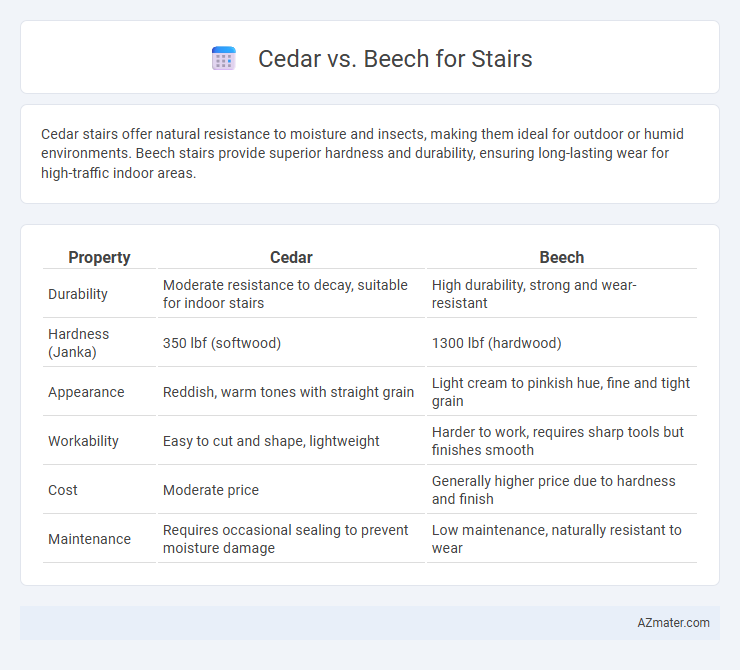Cedar stairs offer natural resistance to moisture and insects, making them ideal for outdoor or humid environments. Beech stairs provide superior hardness and durability, ensuring long-lasting wear for high-traffic indoor areas.
Table of Comparison
| Property | Cedar | Beech |
|---|---|---|
| Durability | Moderate resistance to decay, suitable for indoor stairs | High durability, strong and wear-resistant |
| Hardness (Janka) | 350 lbf (softwood) | 1300 lbf (hardwood) |
| Appearance | Reddish, warm tones with straight grain | Light cream to pinkish hue, fine and tight grain |
| Workability | Easy to cut and shape, lightweight | Harder to work, requires sharp tools but finishes smooth |
| Cost | Moderate price | Generally higher price due to hardness and finish |
| Maintenance | Requires occasional sealing to prevent moisture damage | Low maintenance, naturally resistant to wear |
Introduction to Cedar and Beech Wood
Cedar wood is prized for its natural resistance to moisture, decay, and insect damage, making it an excellent choice for staircases in humid or outdoor environments. Beech wood, known for its hardness and fine grain, provides superior strength and durability, ideal for indoor stairs that require strong structural support and a smooth finish. Both woods offer unique aesthetic and functional benefits, with cedar showcasing warm reddish hues and aromatic properties, while beech features a pale, uniform appearance that readily accepts stains and finishes.
Key Differences Between Cedar and Beech
Cedar stairs are prized for their natural resistance to moisture, rot, and insect damage, making them ideal for outdoor or humid environments, while beech stairs offer exceptional hardness and durability, suitable for high-traffic indoor areas. Cedar features a distinct reddish-brown hue with a softer texture, providing a rustic aesthetic, whereas beech has a pale, creamy color with a fine, tight grain that lends a more polished and modern appearance. The cost difference is notable; cedar is generally less expensive due to its faster growth rate, whereas beech's density and stability can drive up prices and require more effort during installation.
Durability and Longevity Comparison
Cedar staircases offer moderate durability with natural resistance to decay and insect damage, making them suitable for indoor use with proper maintenance. Beech stairs provide higher hardness and wear resistance, resulting in longer-lasting surfaces ideal for high-traffic areas. Overall, beech outperforms cedar in longevity due to its superior strength and ability to withstand daily wear.
Appearance and Aesthetic Appeal
Cedar offers a rich reddish-brown hue with natural knots and a straight grain that creates a warm, rustic appearance ideal for cozy interiors. Beech features a pale cream color with tight, uniform grain patterns, lending a smooth, contemporary look suitable for modern stair designs. The choice between cedar and beech impacts the staircase's visual character, with cedar emphasizing natural texture and warmth, while beech provides a sleek, minimalist aesthetic.
Strength and Structural Integrity
Cedar offers moderate strength with natural resistance to moisture and decay, making it suitable for staircases in humid environments, but it is softer and more prone to dents compared to beech. Beech wood is notably harder and denser, providing superior structural integrity and durability for stairs that endure heavy foot traffic and weight. Choosing beech ensures longer-lasting staircases with higher load-bearing capacity, while cedar's appeal lies in its aesthetic warmth and natural resistance properties.
Resistance to Moisture and Decay
Cedar demonstrates superior resistance to moisture and decay compared to Beech, making it an excellent choice for staircase applications in humid environments. Its natural oils provide inherent protection against rot and insect damage, extending the lifespan of stair components. Beech, while dense and strong, is more susceptible to moisture absorption and fungal decay, requiring additional treatment to maintain durability over time.
Maintenance Requirements for Stairs
Cedar stairs require regular sealing and occasional sanding to maintain their natural resistance to moisture and decay, making them relatively low-maintenance compared to other woods. Beech stairs demand more frequent sealing and protection from humidity due to their susceptibility to swelling and warping. Both woods benefit from routine cleaning and inspection, but cedar's natural oils reduce the intensity of upkeep needed for stair durability.
Cost Comparison: Cedar vs Beech
Cedar staircases typically cost more than beech due to cedar's natural resistance to rot and insects, which reduces long-term maintenance expenses. Beech offers a more budget-friendly option with a lower initial price per board foot, but may require additional treatments or repairs over time. The choice between cedar and beech for stairs often hinges on balancing upfront costs against durability and maintenance considerations.
Environmental Impact and Sustainability
Cedar stairs offer a lower environmental impact due to their natural resistance to decay, reducing the need for chemical treatments compared to Beech. Beech, while durable, often requires more intensive processing and shortens sustainability due to its slower growth rate and higher density. Choosing sustainably harvested Cedar from certified forests supports better carbon sequestration and biodiversity preservation in stair construction.
Best Applications: Which Wood is Right for Your Stairs?
Cedar offers natural resistance to moisture and rot, making it ideal for outdoor or humid environments, while its lightweight nature allows easier installation for custom staircases. Beech, known for its hardness and fine grain, provides excellent durability and a smooth finish, perfect for high-traffic interior stairs requiring strong structural integrity. Choosing Cedar suits stair projects needing weather resistance and natural aesthetics; Beech excels in indoor settings demanding robustness and a polished appearance.

Infographic: Cedar vs Beech for Stair
 azmater.com
azmater.com